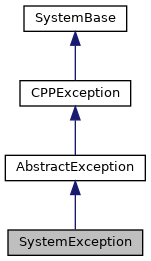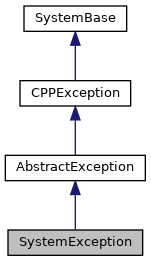The <class>Exception.SystemException</class> class provides access to information about the most recent system error. More...


Public Member Functions | |
| _.Library.String | AsSystemError () |
| Convert this system exception to a traditional $ZE string. | |
 Public Member Functions inherited from AbstractException Public Member Functions inherited from AbstractException | |
| _.Library.Integer | AsSQLCODE () |
| Return the SQLCODE value corresponding to the exception. | |
| _.Library.String | AsSQLMessage () |
| Return the SQL msg string describing details of the exception. | |
| _.Library.Status | AsStatus () |
| Convert this exception to a Status compatible value. | |
| _.Library.String | DisplayString (_.Library.Integer pLevel) |
| This returns a string that represents the exception. More... | |
| _.Library.Status | Log () |
| Call the log function (LOG^ETN) to log this exception. More... | |
| OutputToDevice (_.Library.Integer pLevel) | |
| This outputs the string representation of the exception to the current device, recursively. More... | |
| OutputToStream (_.Library.CharacterStream pStream, _.Library.Integer pLevel) | |
| This outputs the string representation of the exception to the supplied stream, recursively. More... | |
| SQLMessageString (_.Library.Integer pLevel) | |
| This returns a string that represents the SQL msg string. More... | |
| _.Library.Status | StackAsArray (array) |
| This method sets an array that is passed by reference to the execution stack at the time of the exception. More... | |
Private Member Functions | |
| _.Library.Status | __OnAsStatus () |
| Override this method to provide a custom conversion of an exception to a status. | |
Additional Inherited Members | |
 Public Attributes inherited from CPPException Public Attributes inherited from CPPException | |
| Code | |
| Code is the error code. More... | |
| Data | |
| Data is extra information supplied for certain errors. More... | |
| InnerException | |
| This holds an Inner exception. More... | |
| Location | |
| Location is the location at which the error occurred. More... | |
| Name | |
| Name is the name of the error. More... | |
The <class>Exception.SystemException</class> class provides access to information about the most recent system error.
It is the type of object assigned to the CATCH variable when a system error occurs inside a TRY block. Only the System should create an instance of this class.
For system exceptions, the values of the properties should be interpreted as follows:
Name: The name of the exception, such as UNDEFINED.
Code: A numerical code that represents the exception, defined by the system.
Location: A string containing the routine and line where the exception occured.
Data: Depending upon the actual exception, extra data about the exception. For example, for an UNDEFINED error this would be the name of the variable that was undefined.